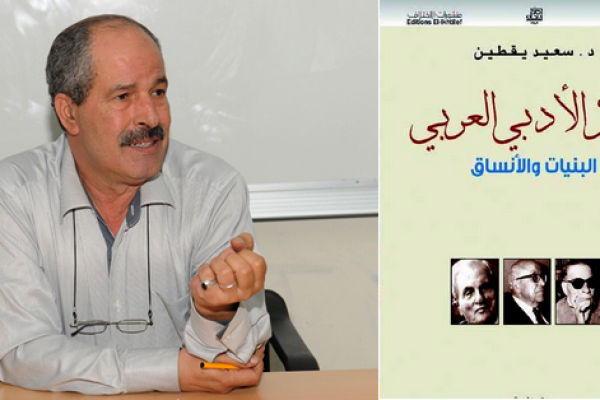Marrakesh-Dr. Said Yaktin is one of the most prominent Moroccan figures who influenced the Arabic literature. He enriched the Arabic cultural scene with many novels that tackle most fields of literature like the “Analysis of Novelist Discourse” published in 1989.
Below, is a wrap-up of the interview with Dr. Yaktin:
*Winning the “Sheikh Zayed Award in Arts & Critical Studies” was a chance to emphasize the shortfalls of media, cultural, and literary practices in the Arab world and to “criticize the absence of accurate expertise in those practices”! Is this absence due to the forms of creativity we obtain in school and university? Therefore we become “encyclopedic”, we know everything or we know nothing, either specialized in a specific field that we know everything about or know nothing about?
– It’s true, and this was my first concern ever since I started writing. Tackling our cultural, social, and academic reality from a view that sheds light on its problems has always been my concern. The award was an important chance regarding the significance of the event and the cultural position it enjoys.
*How did awards contribute to bringing educated activists and officials from the Arab world closer to each other?
– Awards can be considered a cultural event of which everyone patiently awaits the results. The awards contribute to introducing new names and reassessing old ones, but I don’t think they can do more in bringing people closer.
Educated people should know each other through public cultural events or reading. But some new names or those who don’t enjoy a significant role in the Arabic cultural scene can benefit from awards to mark their presence and draw attention to their work.
* Regardless of awards’ advantages and shortfalls in the Arab world, how can they revive the Arabic cultural scene?
– Impacts of awards are still limited in the Arab world for many reasons including the weakness of media coverage. Many of those who write about these awards don’t have enough information about the process and rely only on committees’ reports in their coverage.
* Your new book discusses “the way we cope with literature and literary study since renaissance era to date, aiming to highlight the lack in our literary maturity that obstructs its development”. Apparently, you have adopted the trial and criticism formula to evaluate a critical phase of our history related to the general condition and to the maturity level that hinders development, is that true?
– I accept this description if it is based on an objective reading. My aim in this book is to think about a practice that has been fulfilled through time, a century ago. This thinking first seeks to acknowledge achievements and to work on diagnosing the incentives, and the reasons that made our practices live a strained reality.
* In your writings, you use keywords that focus on the importance of “Modernization”?
– My belief in the relativity of thoughts and facts is part of my belief in the development of ideas. But when I call for modernization, I don’t mean that we have to imitate the West; I rather mean that we should participate in the modern intellect and contribute to developing the human awareness by investing our culture and interaction with the modern culture.
